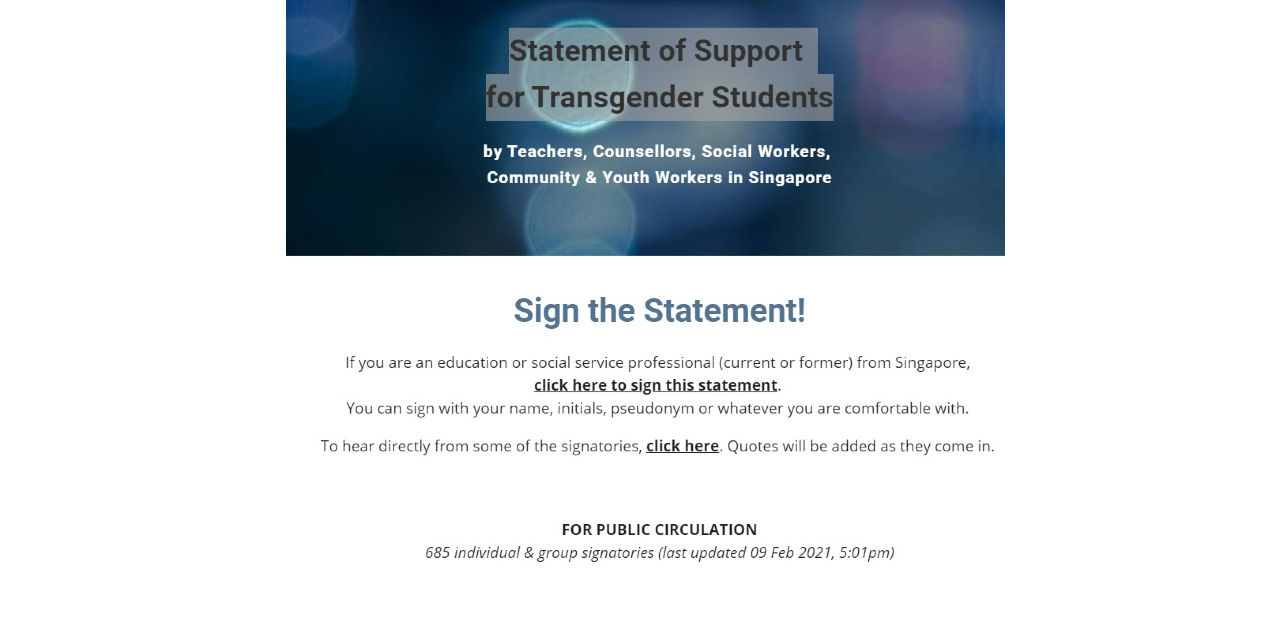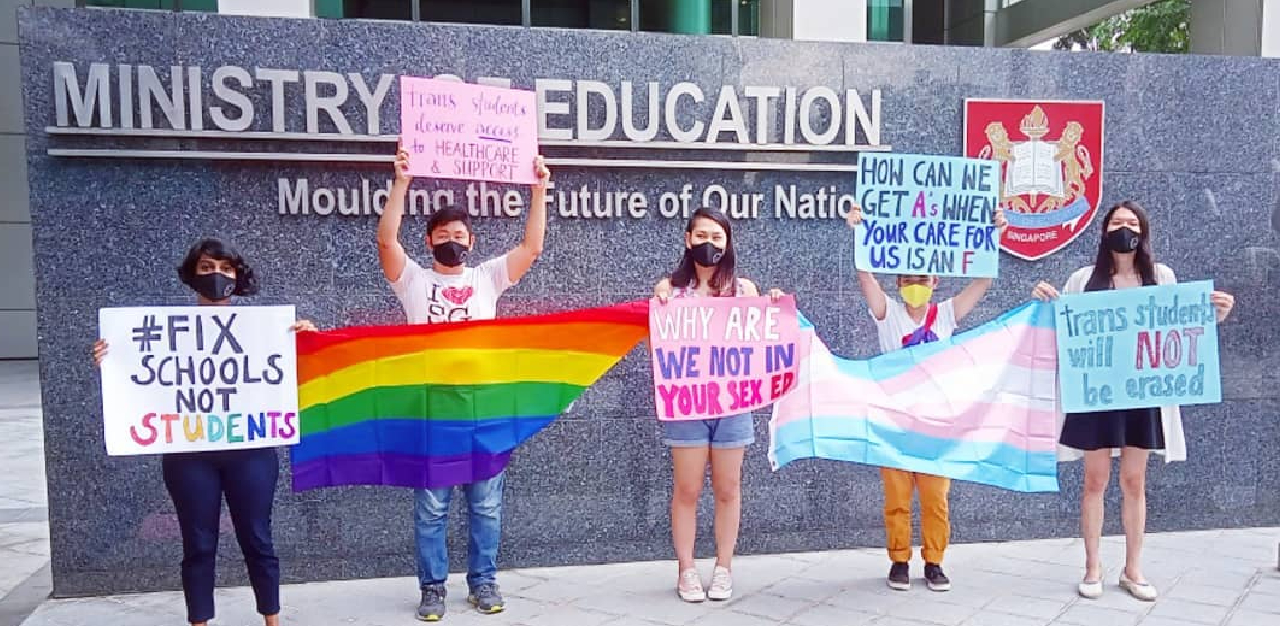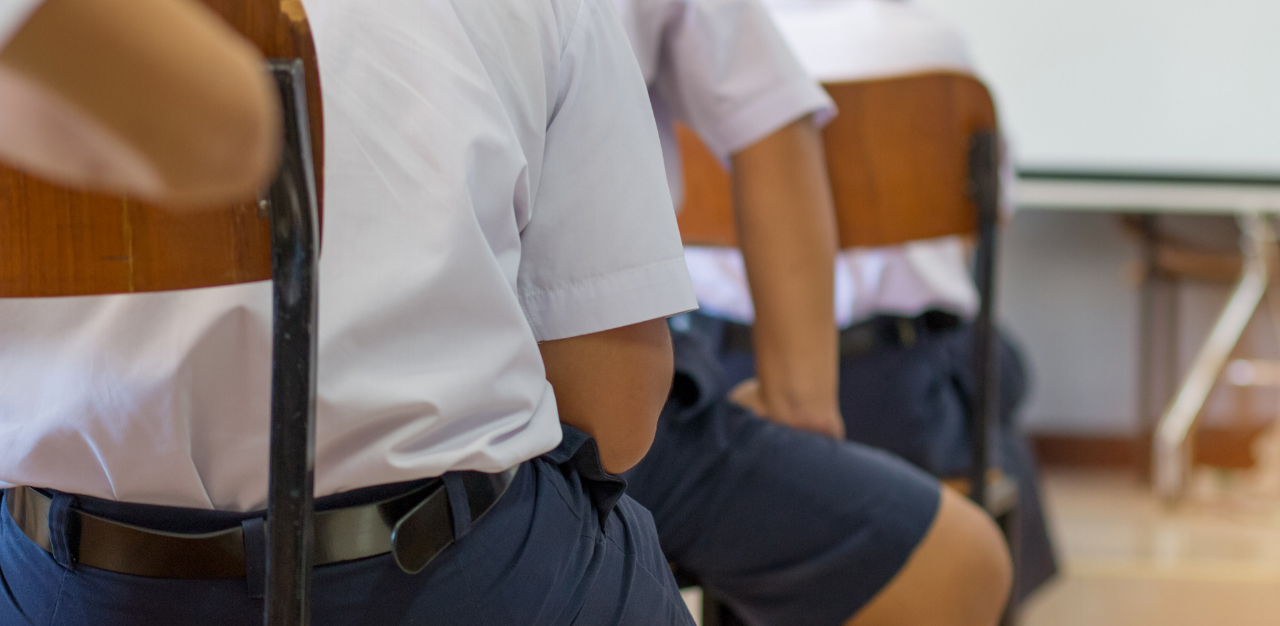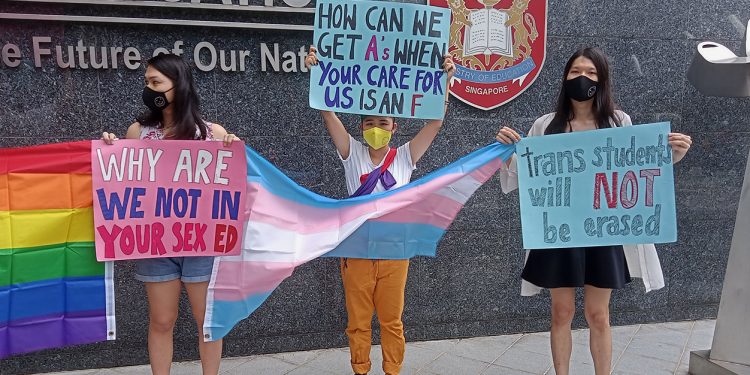‘Statement of Support for Transgender Students by Teachers, Counsellors, Social Workers, Community & Youth Workers in Singapore’ displays boldly on the top of the petition page, organised by community group Friendly People SG.
It was initiated in January after Ashlee, a transgender female student, had alleged that the public pre-university centre institution she was attending had told her that she could only attend classes if she cut her hair, and wore the uniform for male students. The institution had, according to Ashlee, threatened to expel her. In the statement that went viral, she had also accused the Ministry of Education (MOE) for stopping her from receiving the hormone replacement therapy that was needed, which MOE has since denied.
When the statement was first released, it was signed by over 300 teachers and civil servants. According to its last update in February, the petition had garnered some 685 individual and group signatories, including from teachers, counsellors, social workers, school leaders, school nurses, MOE officers and psychologists.

A Friendly People SG member and teacher at a post-secondary institution, who only wants to be known as ‘R’, feels that as an educator, she should practise what she preaches, and stand up for what is, in her mind, right.
In an interview with TheHomeGround Asia, R explains what the petition has achieved, so far, and what motivated Friendly People SG to create it and issue a public statement, in the first place.
(NOTE: The interview has been edited for clarity and length.)
R: A group of teachers and social workers were distressed when we read about a transgender student’s experience of discrimination at her school, including claims that the Ministry of Education and her school had interfered to stop her from receiving the hormone therapy that her doctor advised.
However, civil servants are generally not allowed to speak to the media without authorisation. Raising awareness about issues is especially difficult for teachers who work in unsupportive school environments. Under these environments, we have no power or channel internally to voice our opinions in support of transgender students. It may also jeopardise our jobs or have our professional abilities called into question.

Nevertheless, we believe that it is our professional duty to protect and care for all the young people we teach, counsel and guide. This is why over 300 of us teachers and social workers formed the Friendly People SG. We decided to write a public statement, Statement of Support for Transgender Students, calling on the Ministry to implement and communicate a clear policy on supporting transgender students at schools, in line with advice from healthcare professionals, and in consultation with the respective students and their families. It was sent on 29 January 2021 to: [then] Minister for Education Lawrence Wong; Second Minister for Education, Mohd Maliki Bin Osman; as well as Ministers of State for Education, Sun Xueling and Gan Siow Huang.
Ours is a statement and not just a petition, as we intended not just to ‘petition the authorities’, but to also make a stand and hopefully persuade the wider public to be supportive of transgender students, as well.
THG: What are your thoughts that petitions are the digital movements of physical protests and demonstrations?
R: In my view, petitions, statements, protests and demonstrations may call for similar ends, but they are quite different in substance. While petitions and statements allow for more people to participate in a safer manner, which is perhaps ‘more palatable’ in the eyes of both participants and public, it is also easily ignored by authorities and the public. Until now, we have not received any direct response from MOE.

An in-person protest has a visual physicality that cannot be easily ignored. For example, the MOE protestors against transphobia on 26 January have given us a powerful image of rainbow flags. The nation will indelibly be marked by the protestors outside the MOE building. The image of them being arrested by the police also cannot be erased. They are still under investigation, and we will have to see how repressive (or not) the State and law will be to them. There is something so moving about the fact that people would put themselves in danger, risking arrest and jail, to make a point.
THG: What did you hope to achieve through this petition? Has it achieved the goals you set out?
R: As far as I am aware, this is the first time that education and social service professionals in Singapore have taken a stand collectively on any issue, and certainly it is the first time this group of professionals are speaking up for transgender students. In broad terms, we wanted to tell students that there are teachers and social service professionals out there who support them. We hope this aim has been somewhat achieved.

However, our other aims have not really been achieved. In the statement, we called on MOE to do the following:
- Implement and communicate a clear policy on supporting transgender students at schools, in line with advice from healthcare professionals, and in consultation with the respective students and their families.
- Equip schools to create a safe school environment for all students, including transgender students.
On 1 February, Minister Lawrence Wong said in Parliament that “schools can exercise flexibility and work out practical arrangements for students diagnosed with gender dysphoria, and undergoing hormone therapy if they face difficulties with certain school rules”. MOE also stated that it would work closely with the Ministry of Health’s healthcare professionals and respect professional advice given.
While these statements by MOE are positive steps, the question is how such policies are implemented in the schools, and the extent to which realities match these aspirations.
Even if it is true that the Ministry does not have an explicit policy that actively intervenes in transgender students’ medical procedures. Many argue that there needs to be a clear anti-discrimination policy communicated to all schools, and concrete steps taken to ensure this, so that students are not subjected to school leaders’ personal prejudices or beliefs in the name of ‘flexibility’.
As Ashlee pointed out, while flexibility is good, it means that the school could still bar her from lessons in school, that is, giving her no access to hands-on practice for science practicals project work, or co-curricular activities, which is what she wanted.
I also personally have not heard of any schools taking concrete steps to train or equip their staff in helping and supporting transgender students.
This is the experience of one MOE teacher: ‘I don’t know how it is in other schools. However, for my school, we are told to report concerns to do with gender identity immediately.’
However, beyond that, as far as I know, teachers in my school have not been trained to handle those issues with empathy (issues related to transgender students, gender identity, bathroom or uniform choices). After the recent case involving the transgender student, some teachers in my school suggested to our principal that we have a staff conversation about this issue – to share our views and discuss how we can, as a school, better support such students. The principal denied this request and simply instructed us that should students express gender identity issues, we should refer it to him directly. After the statement went public, there was still no change in my school.

THG: Online petitions and physical protests both have their costs. Would you say they are safer, or more dangerous than physical protests, considering how fast fake news, mob mentality and cancel culture spread virtually?
R: There is definitely the danger that online petitions could be a cover for online bullying or doxxing of individuals.
For our statement, our main issue to grapple with was one of credibility and accountability, because while it was a statement to be signed by education and social service professionals only, if it went online, technically anyone else could sign it.
That’s why we decided to add in another step to improve our credibility. We got people to sign up via a Google form where they had to indicate their profession twice. There were some troll entries that we deleted. I think this added step helped us to put together a genuine list of signatories, and I’m glad that it was recognised in the mainstream media.
Ideally we would have liked to collect more signatures and include our names in it. That would be even more credible. But it is a sad state of affairs that if we wish to keep our jobs, we cannot speak up openly in Singapore about such matters of discrimination and equality.
Join the conversations on TheHomeGround Asia’s Facebook and Instagram, and get the latest updates via Telegram.














